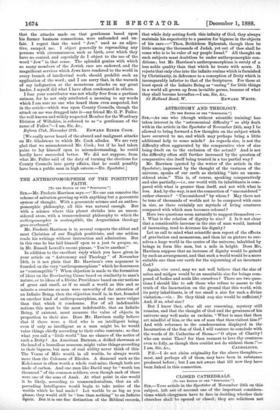THE ANTHROPOMORPHISM OF THE POSITIVIST FAITH.
[To THE EDITOR OF THE " SPECTATOE:1 Su,—Mr. Frederic Harrison says :—" No one can conceive the scheme of salvation growing up with anything but a geocentric system of thought. With a geocentric science and an anthro- pomorphic philosophy, all this was natural enough. But with a science where this planet shrinks into an uncon- sidered atom, with a transcendental philosophy to which he anthropomorphic is contemptible, the Augustinian theology goes overboard."
Mr. Frederic Harrison is in several respects the ablest and
most Christian of our English positivists, and one seldom reads his writings without instruction and admiration. But in this case he has laid himself open to a just tu quoque, or, in Mr. Russell Lowell's recent phrase, "You're another."
In addition to the excellent reply which you have given in your article on "Astronomy and Theology" of November 24th, is it not plain that Mr. Harrison's own argument is founded on the very "anthropomorphism" which he denounces as "contemptible"? When objection is made to the formation of ideas on the Everlasting Cause based on similarity to man's nature, or to ideas of a Divine Providence based on our notions of great and small, as if so small a world as this and so minute a creature as man were unworthy of the attention of an Infinite Being, then the objection itself is, in fact, founded on another kind of anthropomorphism, and one more vulgar than that which it condemns. For of all indefensible notions this must be the most indefensible, that an Infinite Being, if existent, must measure the value of objects in proportion to their size. Does Mr. Harrison really believe that if there were a God who is an intelligent being, even if only as intelligent as a man might be, he would value things chiefly according to their cubic contents ; so that what you call a "little world" has no chance of the notice of such a Deity? An American Barnum, a deified showman at the head of a boundless museum, might value things according to their bigness, but men of real ability never think of this. The Venus of Milo would, in all worlds, be always worth more than the Colossus of Rhodes. A diamond such as the Koh-i-noor is often worth a whole coal-mine, though both are made of carbon. And one man like David may be "worth ten thousand" of the common soldiers, even though each of these were one of the sons of Auak At what point in size would it be likely, according to transcendentalism, that an all- pervading Intelligence would begin to take notice of the worlds which he had made ? Let worlds be as big as you please, they would still be "lees than nothing" to an Infinite Spirit. But it is one fine distinction of the Biblical records, that while duly setting forth this infinity of God, they always maintain his superiority to a passion for bigness in the objects
of his care Thou, Bethlehem Ephratah, though thou be little among the thousands of Judah, yet out of thee shall he come who is to be rider of my people Israel." All thought on such subjects must doubtless be under anthropomorphic con-. ditions ; but Mr. Harrison's anthropomorphism is surely of a. less noble quality than that which he treats with scorn. It rejects that only clue into the infinite realms which is furnished by Christianity, in deference to a conception of Deity which is incomparably inferior to that of the Scriptures. For these at least speak of the Nfinite Being as " caring " for little things' in a world all grown up from invisible germs, because of what they shall become hereafter.—I am, Sir, &c.,










































 Previous page
Previous page